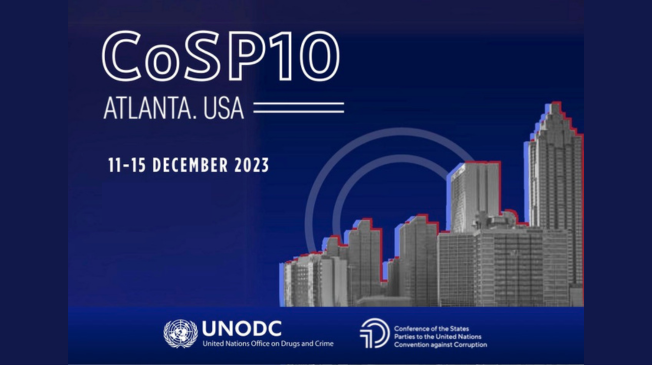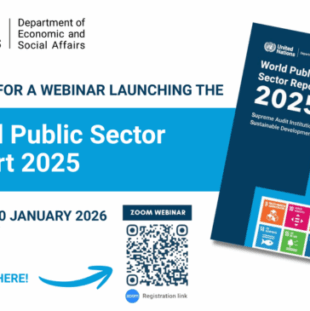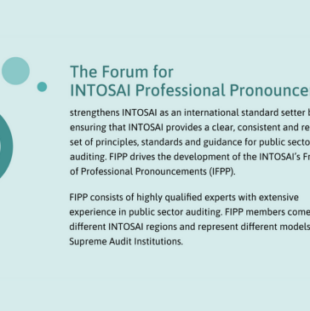Supreme Audit Institutions and Anti-Corruption Bodies Join Forces to Counter Corruption

The United Nations Office on Drugs and Crime (UNODC) organized and held a third pre-event on 10 December 2023, the day before the start of the 10th Session of the Conference of the States Parties to the United Nations Convention against Corruption in Atlanta, Georgia, United States of America.
The pre-Conference event gathered officials, experts, and guests from Supreme Audit Institutions (SAI), Anti-Corruption Bodies (ACB) and other relevant stakeholders from around the world, which have greatly supported and contributed to the development of Practical Guide on Enhancing Collaboration between Supreme Audit Institutions and Anti-Corruption Bodies (Guide). The event aimed to reflect on the achievements and challenges of the Abu Dhabi Declaration Programme and, explore the ways forward in enhancing the collaborative alliances between SAIs and ACBs at the national and regional levels, and to allow for more operational collaborative platforms.
The event started with opening remarks from Ms. Brigitte Strobel-Shaw, Chief, Corruption and Economic Crime Branch–UNODC and Mr. Saud Abdalla, Senior Legal Consultant, Integrity and Anti-Corruption Sector, SAI United Arab Emirates. Ms. Strobel-Shaw and Mr. Abdalla emphasized the progress achieved by the Programme, in addition to the good practices that have been promulgated through the regional workshops. Among other examples mentioned were key workshops held in Latin America and the Caribbean and in Bosnia and Herzegovina in response to the Programme. They also cited particularly positive reception to sections of the Guide that outlined the respective authorities of SAIs and ACBs and capacity building and training. They expressed their desire that the event enhance the partnerships established through the Programme and identify future opportunities for collaboration.
The event’s first panel focused on the reflections, impact and opportunities posed by the Abu Dhabi Declaration Programme. Speakers emphasized the impact of the Programme in promoting the increasing role of SAIs in anti-corruption efforts. Two speakers also signaled that their SAIs had built on their anti-corruption work, in line with what the Programme has been advocating for, by enhancing prevention efforts, detecting the misuse of public funds with a comprehensive audit scope and the strengthening of political oversight and awareness on corruption risks by participating in parliamentary hearings.

The second panel built on the presentations of the first panel and highlighted concrete examples of successful collaboration or coordination from regional and national perspectives and outcomes. The speakers emphasized that an important entryway for SAIs in the anti-corruption work was their contribution to and implementation of parts of national anti-corruption strategies or plans, among others. Some speakers also provided case studies as examples of how they have been able to benefit from sharing relevant data and other areas of increased collaboration or coordination with their audit and anti-corruption counterparts. Other speakers cited the value in communications between the SAI and ACB about the areas of focus and timing of efforts, to increase the quality of responses and reduce duplication, where possible.
The third panel focused on existing and potential models and operational actions that facilitate the stronger collaboration between authorities. One speaker emphasized the approach of the Organization of Latin American and Caribbean Supreme Audit Institutions (OLACEFS) of enhancing cooperation through the regional policy to prevent and fight corruption. Another speaker highlighted the use of information and communication technologies to promote an efficient exchange of information, as well as data-driven digital innovation to strengthen integrity and accountability.
The final panel offered a forward-looking approach and asked panelists and participants to identify common interests, challenges and future actions that will facilitate effective collaboration as a way forward. The panelists concluded that there was a continued need to contextualize institutional collaboration, moving away from competition and conflict towards more efficient coordination, as well as supporting SAIs and ACBs at the national level with localized partnerships across the entire anti-corruption ecosystem.
For additional information about the UNODC’s Action against Corruption and Economic Crime, please visit: https://www.unodc.org/unodc/corruption/





